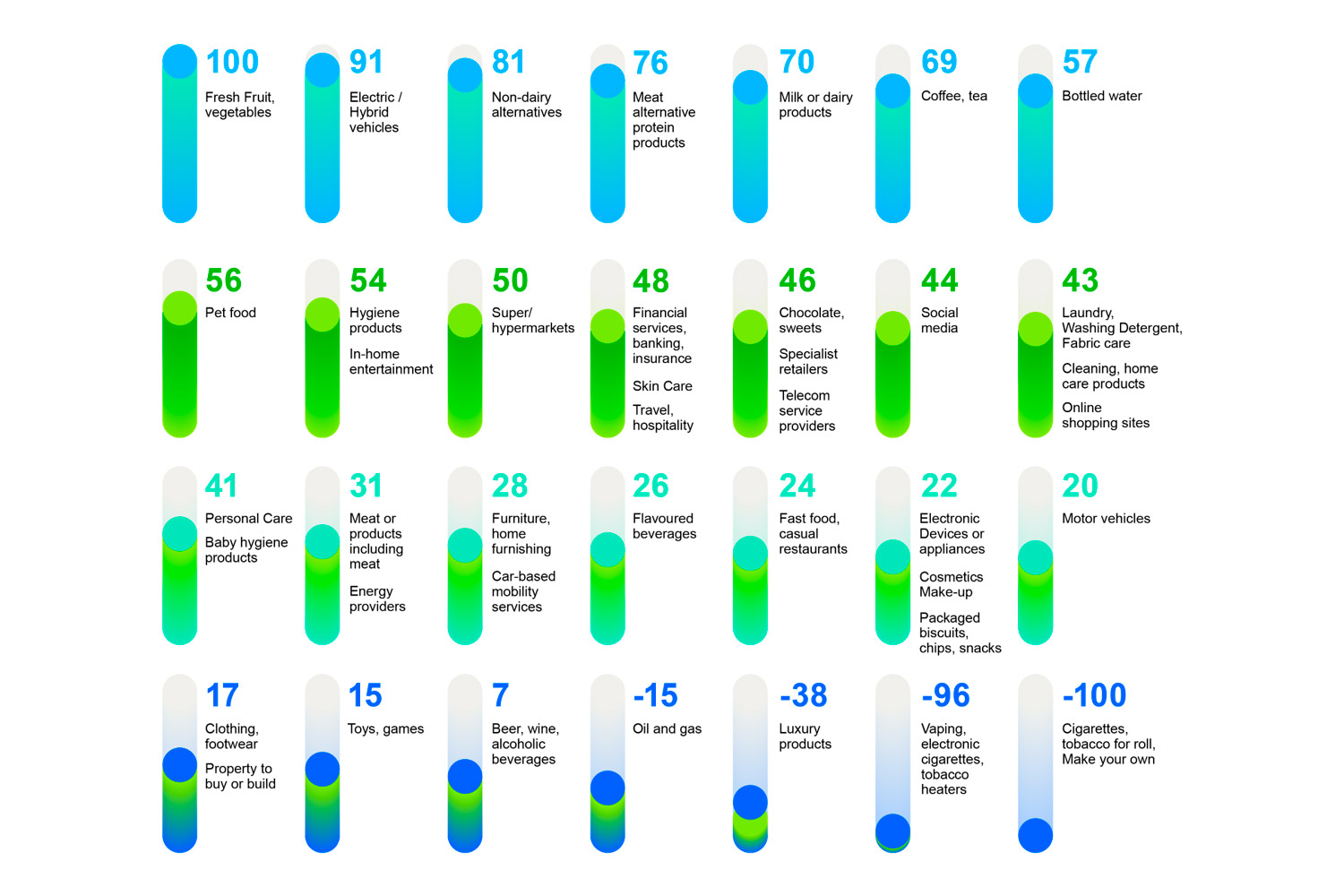People no longer sense some abstract feeling that society needs to change - they are increasingly demanding a concerted focus on impactful action.
Globally, when mapping people's concerns against the UN’s Sustainable Development Goals, we see 70% worrying about ‘Climate Action’, 64% about ‘Responsible Consumption and Production’, 58% about ‘Good Health’ and 55% about ‘Reduced Inequalities’.
Yet many brands still lack a relevant and meaningful brand activation plan, that responds to the sustainable revolution and the changing values of consumers, society and the marketplace.
With data insights taken from 33,000 interviews across 42 sectors in 33 countries, Kantar’s Sustainability Sector Index enables you to see where and how your brand can credibly play. By unlocking engagement, you can put social and environmental sustainability at the heart of your brand strategy and build stronger, more valuable brands.
Here we share five key takeaways to build your approach to sustainability and establish your brand leadership in this sphere.
1. Plan according to your sector’s perceived efforts
Knowing where you are starting from is key to understanding what you need to do. The Sustainability Sector Index enables you to see where your sector fits comparatively to all 42 sectors, ranked by people’s perceptions of whether they drive or hinder progress on environmental and social issues.
The ‘born good’ sectors, such as Electric/Hybrid Vehicles rise to the top of the rankings. Certain sectors come in not just at 0%, but very negatively, such as Oil/Gas and Cigarettes at -100%, Vaping/Electronic Cigarettes at -96% and Luxury Products at –38%, highlighting the need for radical innovation.
2. Find your most effective levers of change
For each of the 42 sectors, we can unpack what sits behind these perceptions. We identified four key marketing dimensions which are essential to create engagement around Sustainability, which are:
- Strategy
- Innovation
- Activation
- Impact
Using consumer language, we asked people about specific brands in these sectors, to explore perceptions of these in depth and then compare them to the cross-sector average.
These key learnings enable us to understand the levers that brands in each sector should focus on, to be the most effective in engaging people.
Taking Meat-Alternative Protein Products, which scored 76%, as an example, we can see that while it performed strongly in terms of Strategy, its weaknesses were average Activation and a paucity of familiarity of the sector. This provides clear areas requiring improvement, ensuring improved levels of ROI.
3. Conciliate global and local strategies from the get-go
However, sector perceptions can vary dramatically from one country to another. By correlating the similarities and differences between the 33 markets covered, we can identify manageable country clusters with the same overarching sustainability job to be done.
Let’s take the Financial Services/Banking/Insurance sector, as an example. With a global index of 48, it sits in the upper middle of the global sector rankings. However, in Poland it rises into the Top 3 sectors, with an index of 71. In Australia, it sits in the lower middle ranking, with an index of 27. In Mexico, however, it is negatively rated, with an index of –33.
One sector only, but with hugely varying perceptions by country. Thus demonstrating the value of being able to have a consolidated global overview, with specific local dynamics to guide focused action.
4. Proactively address the issue of greenwashing and social washing
We asked people if they had seen or heard false or misleading information about sustainability, covering both greenwashing and social washing. We were amazed by the results – and not in a good way.
52% of consumers said they have seen or heard false or misleading information about sustainable actions taken by brands.. The worst culprit was perceived to be Social Media, with 60% of people agreeing with this. However, even though the Pet Food sector had the lowest association, it still scored 42%. All sectors have a long way to go before they are seen as acting credibly and with strongly positive impact in sustainability.
5. Embrace shifting behaviours in your sector
One piece of good news? 63% of people said they had tried brands that have a more positive environmental or social impact. And 50% of people said they buy less or had stopped buying certain products they perceive as having a negative impact.
Yet the Value-Action Gap remains considerable, between those who want to make a sustainable choice, and those who actually do it. We can look at this by sector, and in Packaged Snacks, for example, the gap is 62%. This reflects the missed opportunity in this sector to provide, communicate and underpin the sustainable choices that consumers are seeking.
Worryingly, the more people are looking for sustainable brands, the greater the correlation with them feeling that those brands greenwash - and the more likely it is that these sustainable brands will drop out of their consideration set. Taking us back to square one.
It is therefore even more vital that we get Sustainability right. The impact of Sustainability issues on people’s lives will continue to grow, hence it is likely their propensity to change will do so – providing we can offer the right solutions that people will want to trial, adopt, embrace and champion.
And this is very much a two-way street. Brands rating highly on the Kantar Sustainability BrandZ Index grew brand value by 31% year on year. With a focus on shared value creation – what benefits your brand, people and the planet - you can futureproof your business and help drive meaningful change for good.


